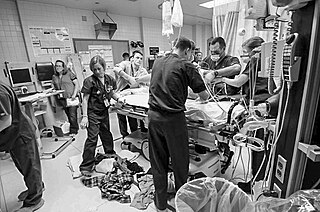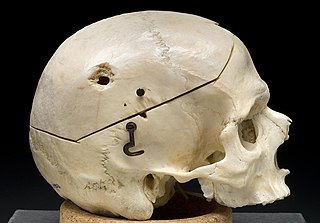Related Research Articles

Medicine is the science and practice of caring for patients, managing the diagnosis, prognosis, prevention, treatment, palliation of their injury or disease, and promoting their health. Medicine encompasses a variety of health care practices evolved to maintain and restore health by the prevention and treatment of illness. Contemporary medicine applies biomedical sciences, biomedical research, genetics, and medical technology to diagnose, treat, and prevent injury and disease, typically through pharmaceuticals or surgery, but also through therapies as diverse as psychotherapy, external splints and traction, medical devices, biologics, and ionizing radiation, amongst others.

Emergency medicine is the medical speciality concerned with the care of illnesses or injuries requiring immediate medical attention. Emergency medicine physicians specialize in providing care for unscheduled and undifferentiated patients of all ages. As first-line providers, in coordination with emergency medical services, they are primarily responsible for initiating resuscitation and stabilization and performing the initial investigations and interventions necessary to diagnose and treat illnesses or injuries in the acute phase. Emergency medical physicians generally practice in hospital emergency departments, pre-hospital settings via emergency medical services, and intensive care units. Still, they may also work in primary care settings such as urgent care clinics.
A trauma center, or trauma centre, is a hospital equipped and staffed to provide care for patients suffering from major traumatic injuries such as falls, motor vehicle collisions, or gunshot wounds. A trauma center may also refer to an emergency department without the presence of specialized services to care for victims of major trauma.

Richard Henry Carmona is an American physician, nurse, police officer, public health administrator, and politician. He was a vice admiral in the Public Health Service Commissioned Corps and served as the seventeenth Surgeon General of the United States. Appointed by President George W. Bush in 2002, Carmona left office at the end of July 2006 upon the expiration of his term. After leaving office, Carmona was highly critical of the Bush administration for suppressing scientific findings which conflicted with the administration's ideological agenda.

The Royal College of Surgeons in Ireland (RCSI) is a not-for-profit medical professional and educational institution, which is also known as RCSI University of Medicine and Health Sciences. It was established in 1784 as the national body for the surgical branch of medicine in Ireland, with a role in supervision of training, and as of 2021 provides a broad range of medical education in multiple countries.

The Medical College of Wisconsin (MCW) is a private medical school, pharmacy school, and graduate school of sciences in Milwaukee, Wisconsin. The school was established in 1893 and is the largest research center in eastern Wisconsin. It is associated with Froedtert Hospital as well as Children's Hospital of Wisconsin and houses the Center for Infectious Disease Research. There are two additional campuses, one in Green Bay and one in Wausau.

The Association of American Physicians and Surgeons (AAPS) is a politically conservative non-profit association that promotes conspiracy theories and medical misinformation, such as HIV/AIDS denialism, the abortion–breast cancer hypothesis, and vaccine and autism connections, through its official publication, the Journal of American Physicians and Surgeons. The association was founded in 1943 to oppose a government attempt to nationalize health care. The group has included notable members, including American Republican politicians Ron Paul, Rand Paul and Tom Price.

In medicine, a surgeon is a medical doctor who performs surgery. Even though there are different traditions in different times and places, a modern surgeon is a licensed physician and received the same medical training as physicians before specializing in surgery.

The University of Wisconsin School of Medicine and Public Health (UWSMPH) is a professional school for the study of medicine and public health at the University of Wisconsin–Madison. It is one of only two medical schools in Wisconsin, along with the Medical College of Wisconsin in Milwaukee, and the only public one.

A gunshot wound (GSW) is a penetrating injury caused by a projectile from a gun. Damage may include bleeding, bone fractures, organ damage, wound infection, loss of the ability to move part of the body, and in severe cases, death. Damage depends on the part of the body hit, the path the bullet follows through the body, and the type and speed of the bullet. Long-term complications can include bowel obstruction, failure to thrive, neurogenic bladder and paralysis, recurrent cardiorespiratory distress and pneumothorax, hypoxic brain injury leading to early dementia, amputations, chronic pain and pain with light touch (hyperalgesia), deep venous thrombosis with pulmonary embolus, limb swelling and debility, and lead poisoning.

The term military medicine has a number of potential connotations. It may mean:

Peter Meong Rhee is an American surgeon, medical professor, and military veteran. During his 24 years in the United States Navy, Rhee served as a battlefield casualty physician in Afghanistan and Iraq.
Mark L. Rosenberg is an American physician and public health researcher. He joined the Task Force for Global Health in 1999, retiring as president and CEO in 2016. Rosenberg also served as Assistant Surgeon General and as Rear Admiral in the United States Public Health Service from 1995 to 2000. He has served on the faculty at Morehouse School of Medicine, Emory University School of Medicine, and the Rollins School of Public Health at Emory University. He previously worked at the Centers for Disease Control and Prevention (CDC) for approximately 20 years, dealing with eradication of smallpox, HIV/AIDS and enteric diseases. He also helped oversee research on gun violence through the National Center for Injury Prevention and Control (NCIPC).
The Dickey Amendment is a provision first inserted as a rider into the 1997 omnibus spending bill of the United States federal government that mandated that "none of the funds made available for injury prevention and control at the Centers for Disease Control and Prevention (CDC) may be used to advocate or promote gun control." In the same spending bill, Congress earmarked $2.6 million from the CDC's budget, the exact amount that had previously been allocated to the agency for firearms research the previous year, for traumatic brain injury-related research.
Joseph V. Sakran is an American trauma surgeon, public health researcher, gun violence prevention advocate and activist. His career in medicine and trauma surgery was sparked after nearly being killed at the age of 17 when he was shot in the throat. He is currently an associate professor of surgery at the Johns Hopkins University, director of Emergency General Surgery at Johns Hopkins Hospital, and vice chair of Clinical Operations. He also serves as the Associate Chief for the Division of Acute Care Surgery.
Social emergency medicine is an emerging branch of emergency medicine that explores the interplay of social forces and the emergency care system, and how these act together to affect the health of individuals and their communities. Organized in 2009, the field has gained wider acceptance within the larger specialty of emergency medicine. Initiatives in social emergency medicine include research, direct service and advocacy aimed at addressing the social determinants of health.

Dean Winslow is an American physician, academic, and retired United States Air Force colonel. He had been nominated by President Donald Trump to become the next Assistant Secretary of Defense for Health Affairs, but he withdrew his nomination in December 2017 after it was put on indefinite hold. He is Professor and former Vice Chair of Medicine at Stanford University. He previously served as Chair of the Department of Medicine and Chief of the Division of AIDS Medicine at the Santa Clara Valley Medical Center. In the Air Force, he deployed twice to Afghanistan and four times to Iraq as a flight surgeon supporting combat operations in Operation Enduring Freedom and Operation Iraqi Freedom.

Megan L. Ranney is a practicing American emergency physician currently serving as the Dean of the Yale School of Public Health. Previously, Ranney served as the Deputy Dean of the Brown University School of Public Health, was Warren Alpert Endowed Professor in the Department of Emergency Medicine at Rhode Island Hospital and the Alpert Medical School of Brown University. Ranney was the founding Director of the Brown-Lifespan Center for Digital Health.
LaMar Hasbrouck is an African-American physician, CDC-trained medical epidemiologist, and public health leader. Hasbrouck is the former executive director for the National Association of County and City Health Officials, and former director of the Illinois Department of Public Health and State Health Officer for Illinois. He is a health policy contributing writer for The Hill, recurrent guest on CNN, former host of AMA Doc Talk, a podcast by the American Medical Association and managing Director for DLM LLC, a health consulting firm.
References
- ↑ "Stephen Hargarten". Medical College of Wisconsin. Retrieved January 31, 2016.
- 1 2 3 4 5 6 "Faculty & Staff". Office of Global Health Website. Retrieved January 31, 2016.
- 1 2 Glauber, Bill (December 20, 2012). "Treat gun violence like disease, Medical College expert says". Milwaukee Journal Sentinel. Retrieved January 31, 2016.
- ↑ Marchione, Marilynn (August 11, 2012). "Doctors target gun violence as a social disease". USA Today. Retrieved January 31, 2016.
- ↑ Brown, David (April 19, 2007). "Traffic Deaths a Global Scourge, Health Agency Says". Washington Post. Retrieved January 31, 2016.
- 1 2 Pasternak, Judy (January 11, 1994). "Taking Aim at Exotic Bullets". Los Angeles Times. Retrieved January 31, 2016.
- ↑ "[N]o injuries have been reported to medical professionals removing the bullets" in "Police use new brand of bullets Surgeon says removal may endanger doctors" by Dan R. Barber, The Dallas Morning News , July 6, 1993.
- ↑ Follman, Mark (December 15, 2012). "More Guns, More Mass Shootings—Coincidence?". Mother Jones. Retrieved January 31, 2016.
- ↑ "Stephen W. Hargarten". National Academy of Medicine. Retrieved January 31, 2016.
- ↑ "Stephen Hargarten Biography" (PDF). Johns Hopkins CEPAR. Retrieved January 31, 2016.